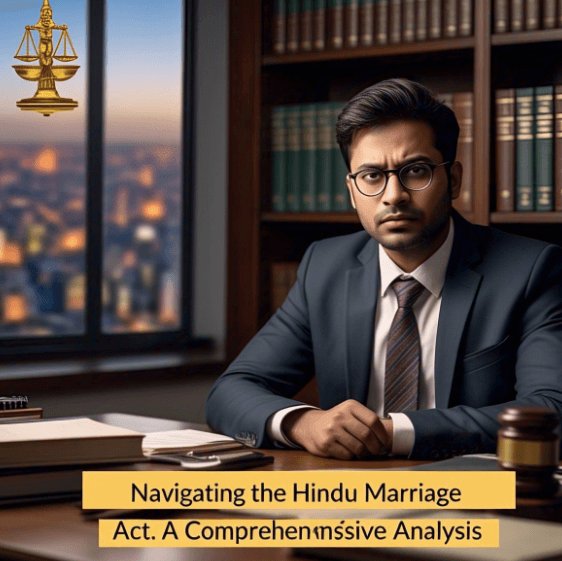Understanding the Hindu Marriage Act: Insights into Marriage, Divorce, and Maintenance
The Hindu Marriage Act, established in 1955, is a significant legal framework governing the marriage, divorce, and maintenance aspects of individuals practicing Hinduism in India. This act not only provides the foundation for Hindu matrimonial law but also reflects the evolving nature of societal norms and values. In this article, we’ll delve into the key facets of the Hindu Marriage Act, emphasizing marriage, divorce, and maintenance.
The Essence of Marriage under the Hindu Marriage Act
Eligibility Criteria for Marriage
Marriage, as defined under the Hindu Marriage Act, is a sacred union between two individuals who meet specific eligibility criteria. Firstly, both parties must be of legal age—21 years for men and 18 years for women. Furthermore, neither individual should have a living spouse at the time of marriage, thereby prohibiting polygamy. Mental soundness is another prerequisite, ensuring both parties are capable of understanding the marriage’s implications. Lastly, the couple should not fall within the degrees of prohibited relationship unless their custom or tradition permits such a marriage.
Solemnization of Marriage
The act outlines various rituals and ceremonies for solemnizing a Hindu marriage, which can vary widely among different communities. However, the core essence remains the exchange of vows in the presence of a sacred fire, symbolizing the commitment and bond between the couple.
Navigating Through Divorce
Grounds for Divorce
The Hindu Marriage Act recognizes several grounds for divorce, including adultery, cruelty, desertion for two years, conversion to another religion, mental disorder, communicable disease, and presumption of death. These grounds reflect the law’s understanding of the complexities and realities of marital relationships.
Mutual Consent Divorce
In a progressive step, the act allows for divorce by mutual consent, acknowledging that couples may amicably decide to part ways. This provision simplifies the legal process, requiring the couple to demonstrate a separation of one year before filing for divorce.
Maintenance: A Critical Component
Maintenance Rights
The act provides for the maintenance of spouses, children, and aged parents. It ensures financial support for those who might not be self-sufficient post-divorce or separation. The court determines the amount based on the respondent’s income and the claimant’s needs, aiming for a fair and equitable solution.
Alimony and Child Support
Alimony and child support are two significant aspects of maintenance. Alimony refers to the financial support granted to the spouse, while child support focuses on ensuring the well-being and education of children from the marriage. These provisions underscore the law’s commitment to protecting the interests of vulnerable family members.
Conclusion: A Balancing Act
The Hindu Marriage Act is a testament to the balance between tradition and modernity, providing a legal framework that respects cultural values while addressing contemporary challenges. By outlining clear guidelines for marriage, divorce, and maintenance, it aims to ensure justice and fairness for all parties involved. This act not only governs the legalities of Hindu marriages but also serves as a reminder of the importance of understanding, compassion, and respect in familial relationships.
FAQs: Hindu Marriage Act: Marriage, Divorce, and Maintenance
- What is the legal age for marriage under the Hindu Marriage Act?
- Men should be 21 years old, and women should be 18 years old to legally marry.
- Can Hindus marry without traditional ceremonies under this Act?
- Traditional ceremonies are essential under the Act, but the specifics may vary across different communities.
- Is inter-caste marriage allowed under the Hindu Marriage Act?
- Yes, inter-caste marriages are permitted under the Act.
- Does the Hindu Marriage Act allow for a Hindu to marry a non-Hindu?
- The Act governs marriages between Hindus. Marriages involving a non-Hindu partner typically require conversion or marriage under a different act, like the Special Marriage Act.
- Can one marry their cousin under the Hindu Marriage Act?
- Marriages between cousins are subject to the customs of the community; some may permit it, while others may not.
- What are the legal grounds for divorce under the Hindu Marriage Act?
- Grounds include adultery, cruelty, desertion, conversion, mental disorder, communicable disease, and presumption of death.
- How long does a couple need to be separated before filing for divorce?
- For mutual consent divorce, the couple must be separated for at least one year.
- Can a wife get a divorce if her husband is impotent?
- Yes, impotency is a valid ground for divorce under the Act.
- Is it possible to remarry immediately after a divorce is granted?
- There is a waiting period of 90 days from the date of decree of divorce to remarry, to allow for appeal against the divorce decree.
- Can a Hindu woman seek a divorce if her husband remarries without her consent?
- Yes, as polygamy is illegal under the Hindu Marriage Act, this would be a valid ground for divorce.
- Who is eligible for maintenance under the Hindu Marriage Act?
- Spouses, children, and aged parents can claim maintenance under certain conditions.
- How is the amount of maintenance determined?
- The court considers the claimant’s needs and the respondent’s ability to pay.
- Can a working wife claim maintenance?
- Yes, but her income may be considered when determining the maintenance amount.
- Is there a difference between alimony and maintenance?
- Yes, alimony is financial support provided after divorce, while maintenance can be claimed during or after marital proceedings.
- Can maintenance be modified?
- Yes, maintenance orders can be modified based on a change in circumstances.
- Does the Hindu Marriage Act apply to NRIs?
- Yes, if they were married under the Act, it applies regardless of their current residence.
- Can same-sex couples marry under the Hindu Marriage Act?
- No, the Act does not recognize same-sex marriages.
- Are online marriages recognized under the Hindu Marriage Act?
- No, physical presence and traditional ceremonies are required for a marriage to be recognized.
- What documents are needed for marriage under the Hindu Marriage Act?
- Age proof, residence proof, and a marriage certificate from a recognized authority are essential.
- How can one prove a marriage under the Hindu Marriage Act?
- Through a marriage certificate issued by the registrar or by evidence of ceremonies performed.
- What is the process for registering a marriage?
- The couple needs to apply to the marriage registrar of their jurisdiction, providing necessary documents and witnesses.
- Can a Hindu marriage be annulled?
- Yes, on certain grounds like impotency, fraud, or if the marriage was not consummated.
- Is mediation required before divorce?
- While not mandatory, courts often recommend mediation to resolve issues amicably.
- How long does the divorce process take?
- It varies, but mutual consent divorces typically take 6-18 months.
- Can grandparents seek custody of children under the Hindu Marriage Act?
- Custody decisions are based on the child’s best interest, and grandparents can be considered.
- Is it mandatory to pay alimony after divorce?
- Not always; it depends on the court’s decision, considering both parties’ financial situations.
- Can a person refuse to pay maintenance?
- Refusal without valid reason can lead to legal consequences, including enforcement actions.
- What happens if one remarries? Does the obligation to pay alimony continue?
- Remarriage of the recipient spouse usually ends the obligation to pay alimony.
- How can one change the terms of maintenance or alimony?
- By applying to the court showing a significant change in circumstances.
- What rights do children have in a divorce?
- Children have the right to maintenance, education, and a safe living environment. Custody is determined based on their best interests.
















